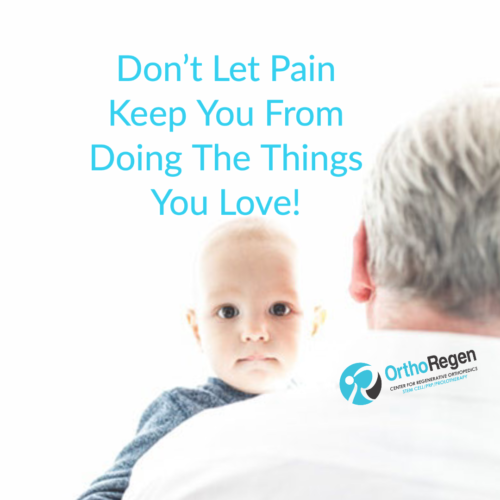
Persistent Joint Pain? Regenerative Orthopedics Gets You Back To Doing What You Love!
Many of us have aches or pains that just won’t go away no matter what we do. Medications, rest, physical therapy, acupuncture, and manipulation just aren’t doing the trick. Somehow that joint pain either never goes away or just keeps coming back. But have you tried Regenerative Orthopedics?
Regenerative Orthopedics is a technique that helps to stimulate the body’s ability to repair a painful area when the natural healing process isn’t cutting it. In most cases, Regenerative Orthopedics is effective at eliminating persistent joint pain due to ligament and tendon weakness 80 to 90 percent of the time.
You might wonder why you still have pain in an injured area or why that area remains weak, even after a healing period of weeks, months, or years. The answer lies in the fact that both ligaments and tendons have very poor circulation. These areas may have little or no blood flow, but they have lots of nerves. When the structures that stabilize the joint become weak, the nerves around them (ligaments and tendons) become stretched and irritated. That produces pain.
Regenerative Orthopedics involves the injection of a solution that causes a healing response that stimulates the healing process. This results in a stronger tendon or ligament that can hold these joint structures in place more effectively.
The weakened area heals, and the patient’s pain is reduced or eliminated. It is also an excellent alternative to cortisone injections. Many doctors still recommend cortisone. That’s unfortunate because long-term studies have shown cortisone to actually weaken tissue.
Most patients require about 4-6 treatments to restore function and relieve pain. The treatments are usually given at about 3-week intervals.
Regenerative Orthopedics is effective for all types of persistent joint pain. It works for the neck, shoulder, knee, elbow, and other joints. Plus, this treatment can reduce or eliminate pain altogether for conditions like tendonitis, arthritis, herniated discs, and headaches.
And if you have a sports injury, look no further than Regenerative Orthopedics. If the injury involves soft tissue, like a tendon or ligament, chances are Regenerative Orthopedics will help. Don’t let joint pain keep you from doing the things you love!